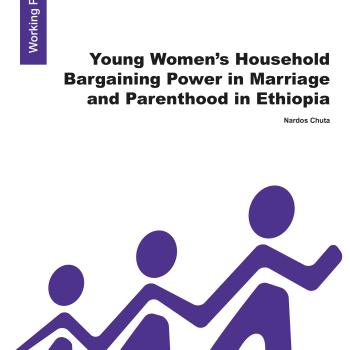Publication Information

This working paper examines the factors that affect the bargaining power of young married women in marriage and parenthood in Ethiopia, where power structures remain overwhelmingly male-dominated and patriarchal. It draws on longitudinal qualitative data and survey information collected by Young Lives with children, young people and their families between 2007 and 2015. The paper’s main focus is young women’s changing relations and analysis of their ‘bargaining power’ before and after marriage. The concept of bargaining power has been used to understand gender inequality, primarily from the field of economics, but this mainly qualitative paper takes bargaining power to mean the negotiating capacity of young married women within their marital relationships and households.
The paper argues that intra-household, social-institutional and individual factors intertwine to shape young women’s agency towards bargaining power in differing areas of their lives. Generally, factors such as urban or rural residence, education, standard of living, customs and norms combine to shape the bargaining power of young women in marriage. Decisions are usually made at a collective level, whereas agency at the individual level is often very shallow.
The paper recommends that policies and programmes targeted towards reducing gender inequality at intra-household level have to consider the wider contexts in which those households are situated, such as how cultural beliefs and norms shape marital practices, gender and generational relations, and decision-making more broadly.

This working paper examines the factors that affect the bargaining power of young married women in marriage and parenthood in Ethiopia, where power structures remain overwhelmingly male-dominated and patriarchal. It draws on longitudinal qualitative data and survey information collected by Young Lives with children, young people and their families between 2007 and 2015. The paper’s main focus is young women’s changing relations and analysis of their ‘bargaining power’ before and after marriage. The concept of bargaining power has been used to understand gender inequality, primarily from the field of economics, but this mainly qualitative paper takes bargaining power to mean the negotiating capacity of young married women within their marital relationships and households.
The paper argues that intra-household, social-institutional and individual factors intertwine to shape young women’s agency towards bargaining power in differing areas of their lives. Generally, factors such as urban or rural residence, education, standard of living, customs and norms combine to shape the bargaining power of young women in marriage. Decisions are usually made at a collective level, whereas agency at the individual level is often very shallow.
The paper recommends that policies and programmes targeted towards reducing gender inequality at intra-household level have to consider the wider contexts in which those households are situated, such as how cultural beliefs and norms shape marital practices, gender and generational relations, and decision-making more broadly.

